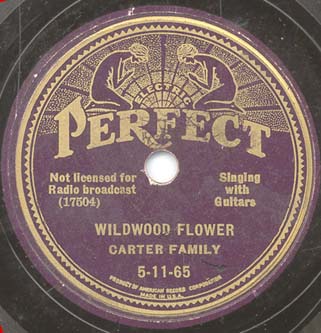Wildwood Flower on:
[Wikipedia]
[Google]
[Amazon]
"Wildwood Flower" (or "The Wildwood Flower") is an American song, best known through performances and recordings by the Carter Family. It is a folk song, cataloged as
 The original Carter Family first recorded "Wildwood Flower" in 1928 on the Victor label. Maybelle Carter leads a rendition of the song on the 1972 album '' Will the Circle be Unbroken'', and frequently performed the song in concert with
The original Carter Family first recorded "Wildwood Flower" in 1928 on the Victor label. Maybelle Carter leads a rendition of the song on the 1972 album '' Will the Circle be Unbroken'', and frequently performed the song in concert with
''The Mystery of Maud Irving''
retrieved 20 September 2013. including '' Godey's Lady's Book'' and
Home Monthly.
' Several of the poems in the latter periodical carry bylines indicating that the ''Maud Irving'' of those poems was a pseudonym for poet and spiritualist J. William Van Namee.
Roud Folk Song Index
The Roud Folk Song Index is a database of around 250,000 references to nearly 25,000 songs collected from oral tradition in the English language from all over the world. It is compiled by Steve Roud. Roud's Index is a combination of the Broadsid ...
No. 757.
History
"Wildwood Flower" is a variant of the song "I'll Twine 'Mid the Ringlets",. published in 1860 by composer Joseph Philbrick Webster, who wrote the music, with lyrics attributed to Maud Irving. Other versions of the song have evolved, including "The Pale Amaranthus" (collected in Kentucky and North Carolina, reported in 1911), "Raven Black Hair" and "The Pale Wildwood Flower" (collected 1915–1919), and "The Frail Wildwood Flower". The original Carter Family first recorded "Wildwood Flower" in 1928 on the Victor label. Maybelle Carter leads a rendition of the song on the 1972 album '' Will the Circle be Unbroken'', and frequently performed the song in concert with
The original Carter Family first recorded "Wildwood Flower" in 1928 on the Victor label. Maybelle Carter leads a rendition of the song on the 1972 album '' Will the Circle be Unbroken'', and frequently performed the song in concert with Johnny Cash
John R. Cash (born J. R. Cash; February 26, 1932 – September 12, 2003) was an American singer-songwriter. Most of his music contains themes of sorrow, moral tribulation, and redemption, especially songs from the later stages of his career. ...
and on his '' The Johnny Cash Show''. The Carter version of the song is considered the premier example of " the Carter Scratch", a form of acoustic guitar
An acoustic guitar is a musical instrument in the string family. When a string is plucked, its vibration is transmitted from the bridge, resonating throughout the top of the guitar. It is also transmitted to the side and back of the instrument, ...
playing in which the musician (in the case of the Carters, most notably Maybelle herself) plays both the melody and rhythm lines simultaneously.
Woody Guthrie used the tune of "I'll Twine 'Mid the Ringlets" for the verses of his song " The Sinking of the Reuben James", although he added a chorus to the song. via the Internet Archive
The Internet Archive is an American 501(c)(3) organization, non-profit organization founded in 1996 by Brewster Kahle that runs a digital library website, archive.org. It provides free access to collections of digitized media including web ...
.
The original poem (if any) from which the lyrics derived has been lost. Other poems attributed to the reputed author of the lyrics, Maud Irving, may be found in periodicals of the time,Bram, Eric M.''The Mystery of Maud Irving''
retrieved 20 September 2013. including '' Godey's Lady's Book'' and
Home Monthly.
' Several of the poems in the latter periodical carry bylines indicating that the ''Maud Irving'' of those poems was a pseudonym for poet and spiritualist J. William Van Namee.
Lyrics
The original lyrics to the 1860 song "I'll Twine 'Mid the Ringlets", taken verbatim from the published sheet music (italics, recognized punctuation, and capitalization as in the original), are as follows.Taken from a compilation published in 1862 showing the 1860 date, located in the William R. and Louise Fielder Sheet Music Collection, Stanford University Libraries: ''I'll Twine 'Mid the Ringlets.'' Words by Maud Irving. Music by J.P. Webster. Copyrighted and Published (1860, 1862) by H.M. Higgins, 117 Randolph Street, Chicago. Pearson, engraver.Evolution
Although originally aparlor song
Parlour music (or parlor music) is a type of popular music which, as the name suggests, is intended to be performed in the parlours of houses, usually by amateur singers and piano, pianists. Disseminated as sheet music, its heyday came in the 19th ...
, the song had undergone the folk process by the time the Carter Family recorded it. For example, the first verse of "I'll Twine 'Mid the Ringlets" is
whereas the Carter Family's "Wildwood Flower" begins
In some versions, the order of the verses is changed, with the one ending in
moved to the end, thus giving the impression that the woman has come to terms with her lost love and can move on.
However, the final verse as originally written,
clearly shows that the woman remains heartbroken, and thus preserves the sad, tragic nature of the song, rather than ending on an upbeat, but ultimately false note.
Notes
{{Authority control Parlor songs American folk songs Carter Family songs Roy Clark songs Hank Thompson (musician) songs Merle Travis songs Joan Baez songs Woody Guthrie songs 1860 songs Songs written by Joseph Philbrick Webster United States National Recording Registry recordings Mike Ness Songs Songs of the American Civil War